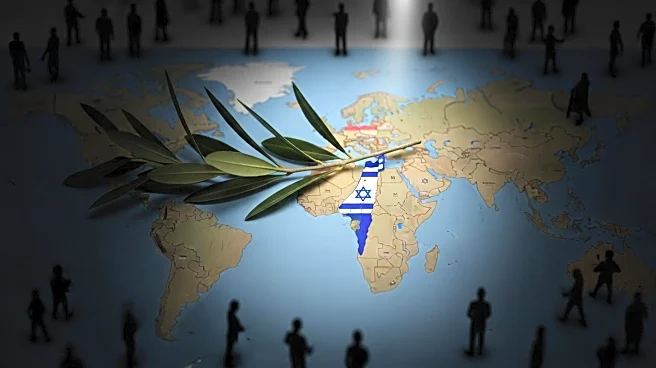What's Happening?
Prime Minister Benjamin Netanyahu has acknowledged Israel's increasing diplomatic isolation, which is extending beyond politics into areas such as economy, culture, science, academia, sports, and tourism. The isolation is driven by opposition to Israel's actions in Gaza and a growing perception of Israel as a 'toxic brand.' Countries may reconsider visa-waiver agreements and restrict entry to Israelis, particularly former IDF soldiers. Research funding and cultural exchanges are also affected, with silent boycotts becoming more common. The economic impact includes consumer boycotts and potential export restrictions. In sports, Israeli teams face challenges in international competitions, and Israel's participation in events like the Eurovision Song Contest is under threat.
Why It's Important?
Israel's diplomatic isolation could have significant implications for its international relations and economic stability. The potential loss of visa-waiver agreements and research funding may hinder academic and cultural exchanges, affecting Israel's global standing. Economic repercussions, such as consumer boycotts and export restrictions, could impact Israeli businesses and the economy. The isolation may also strain Israel's relationships with Western countries and affect its participation in international events. These developments highlight the challenges Israel faces in maintaining its global presence and navigating diplomatic tensions.
What's Next?
Israel may need to engage in diplomatic efforts to mitigate the isolation and restore international relations. This could involve addressing concerns about its actions in Gaza and improving its global image. The government may face pressure to reassess its policies and strategies to prevent further isolation. Additionally, Israel's participation in international events and collaborations may depend on its ability to negotiate compromises and rebuild trust with other countries. The situation may also prompt discussions on the broader geopolitical implications and potential shifts in alliances.
Beyond the Headlines
The diplomatic isolation of Israel raises ethical and cultural questions about the impact of political actions on international relations. It highlights the complexities of balancing national interests with global perceptions and the role of public opinion in shaping diplomatic outcomes. The situation may also influence discussions on the recognition of Palestinian statehood and the broader Middle East peace process. Long-term shifts in Israel's foreign policy and its approach to international diplomacy may be necessary to address these challenges.









